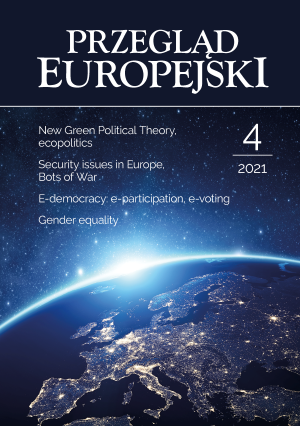Impact of the intra-party democracy on political parties' reactions to the electoral defeats - a case study of the selected political groupings in Poland
Impact of the intra-party democracy on political parties' reactions to the electoral defeats - a case study of the selected political groupings in Poland
Author(s): Małgorzata KaczorowskaSubject(s): Politics / Political Sciences, Politics, Political Sciences
Published by: Wydawnictwa Uniwersytetu Warszawskiego
Keywords: intra-party democracy; electoral defeat; changes; political parties; Poland; demokracja wewnątrzpartyjna; porażka wyborcza; zmiany; partia polityczna; Polska
Summary/Abstract: An electoral defeat usually marks a significant turning point in the life of political parties. It is often the beginning of the changes taking place within them (Harmel, Janda 1994; Gauja 2016: p. 50–51). Existing research suggest that the desire to improve the electoral outcome is the main argument for reform within political parties (Janda 1990; Harmel et al. 1995). This article looks at a relationship between the reactions of political parties to electoral defeat and one factor found to be important in this respect – i.e. the level of intra-party democracy (IPD) analysed at the organisational level. The study uses the IPD measurement model developed by Benjamin von dem Berge and his team (see: von dem Berge et al. 2013). The article provides the analysis of the level of intra-party democracy of the selected four Polish political parties (on the basis of their statutes) continuously present on the Polish political scene after 2001 and its impact on changes within political groupings after electoral defeats. The author examined the statutes of the Law and Justice (PiS), the Civic Platform (PO), the Polish People’s Party (PSL) and the Democratic Left Alliance (SLD). These parties suffered defeats either in the 2011 or 2015 elections. The main research problem is to determine how the level of IPD of the examined parties influences their reactions after electoral defeats. The research hypothesis is: political parties with a higher level of IPD should change under the influence of electoral defeats more than parties with a lower level of this indicator. The study used also the methodology of data analysis (party’s statutes and other documents) and 21 structured in-depth interviews with representatives of party elites. Based on the results, the index of change after defeat in political parties is created.
Journal: Przegląd Europejski
- Issue Year: 2021
- Issue No: 4
- Page Range: 191-207
- Page Count: 17
- Language: English

